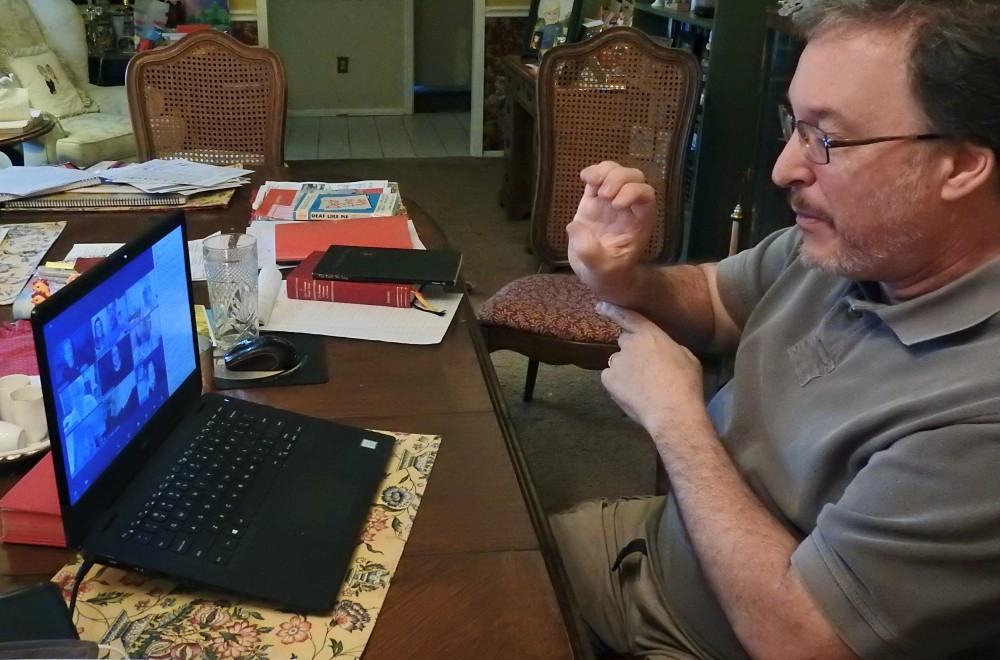Deaf ministries flourish with virtual worship

Before the COVID-19 pandemic, the array of worship services offered by Lovers Lane United Methodist Church included one in American Sign Language. About two dozen people came on a typical Sunday.
On March 22, when the Dallas church could no longer safely meet in person due to the fast-spreading coronavirus, the sign language service moved online.
It came together quickly—and a bit primitively. For want of a tripod, a cell phone with a video camera was propped up by hymnals on an upright piano.
But word had gotten around, and about 200 Deaf and hard of hearing people tuned in.
“I was just stunned,” said Tom Hudspeth, pastor of Deaf ministries at the church.
Since then, viewership of live and archived broadcasts has grown to about 450 weekly. Members of the congregation have been joined by people from around Texas, the US, and the world.
Collins Prempeh, a Deaf student of theology at the UMC’s Africa University, has participated from Zimbabwe.
“We’ve circled the globe on this,” Hudspeth said.
The COVID-19 pandemic has meant all kinds of upheaval for religious groups. For Deaf ministries, it’s been a season of challenges and opportunities.
“I am thrilled at how many online opportunities are now available throughout the country,” said Eastern Pennsylvania Conference bishop Peggy Johnson, who has a long history in Deaf ministries and signs fluently.
Along with livestreaming its sign language service on Sunday, Lovers Lane UMC has added a Wednesday night Zoom gathering for the Deaf and hard of hearing. Hudspeth, born hard of hearing, officiates in sign language.
On August 5, about 15 people from Dallas and beyond joined in, sharing concerns about COVID-19, especially as schools get ready to resume. Some mentioned the depression they’ve battled as the pandemic has kept them quarantined.
“They’re isolated,” said Mary Kay Hudspeth, wife of the pastor and a Deaf participant in the call. “It helps them to have this connection once a week.”
When Deaf or hard of hearing people do go out, for example, to the grocery store, they can face new frustration in trying to understand masked employees.
“Wearing a mask hinders communication for people who need lip reading,” said Esther Choi, a Deaf member of Lovers Lane UMC.
Rosalind McKelvey leads Deaf outreach at Grace UMC in Philadelphia. She’s been distributing masks to essential workers that have a clear plastic panel over the mouth to allow lip reading.
McKelvey has been busy on other fronts, checking in on Deaf church members, interpreting sermons preached during online worship, and passing out COVID-19 information cards to Deaf and hard of hearing people, especially those struggling economically and in other ways.
As churches try to reopen safely for in-person worship, they will have to enforce physical distancing. That means no hugs or handshakes while passing the peace.
Deaf people and allies see an opportunity.
“We have started to have churches use the Deaf sign language sign for ‘I love you,’” said Carol Stevens, a certified lay minister and American Sign Language interpreter at Grace UMC in Wilmington, Delaware. “It is easy to learn and good both virtually and when we get back to worshiping together.”
Stevens, fellow lay minister Karen Miller, and Edwin Esteves, pastor of Grace UMC, collaborated in a short video that teaches the sign language for “Peace be with you” and “I love you.”
Miller, who is deaf, said by email that she’s hopeful the video will help churches and raise awareness among hearing folks of the richness of Deaf culture.
“We are also God’s children,” she said. —United Methodist News Service. Eveline Chikwanah contributed to this story from Zimbabwe.





